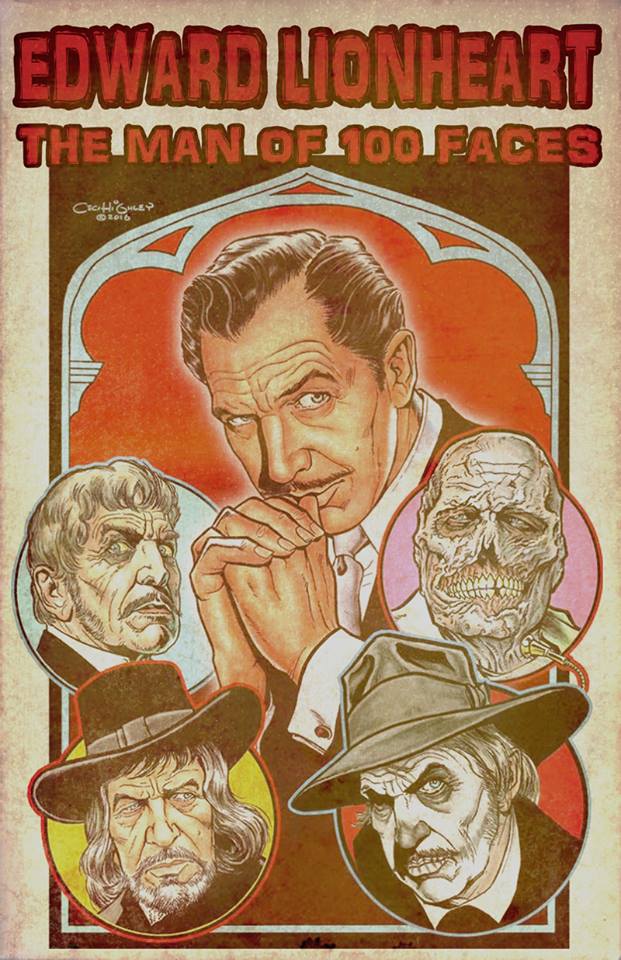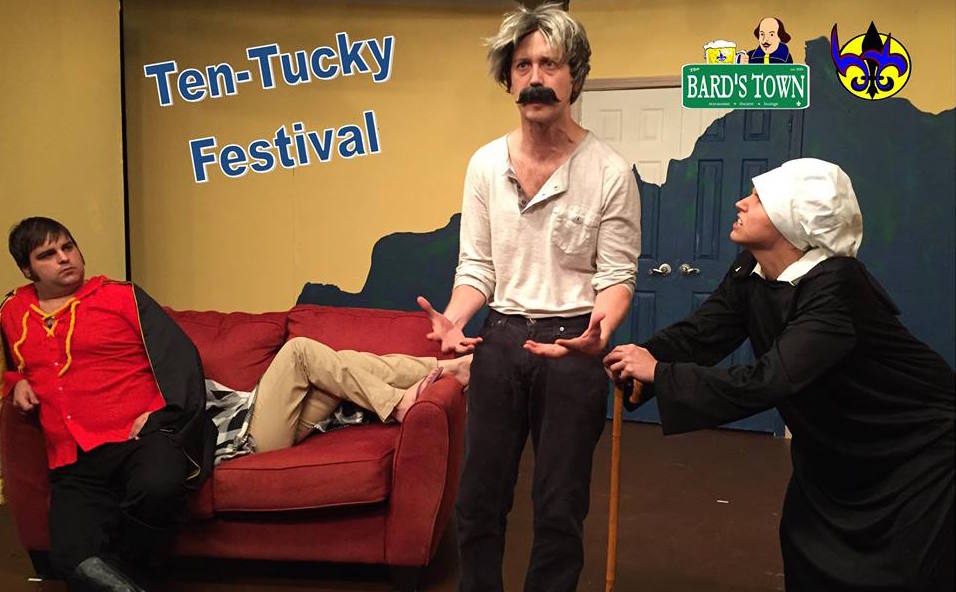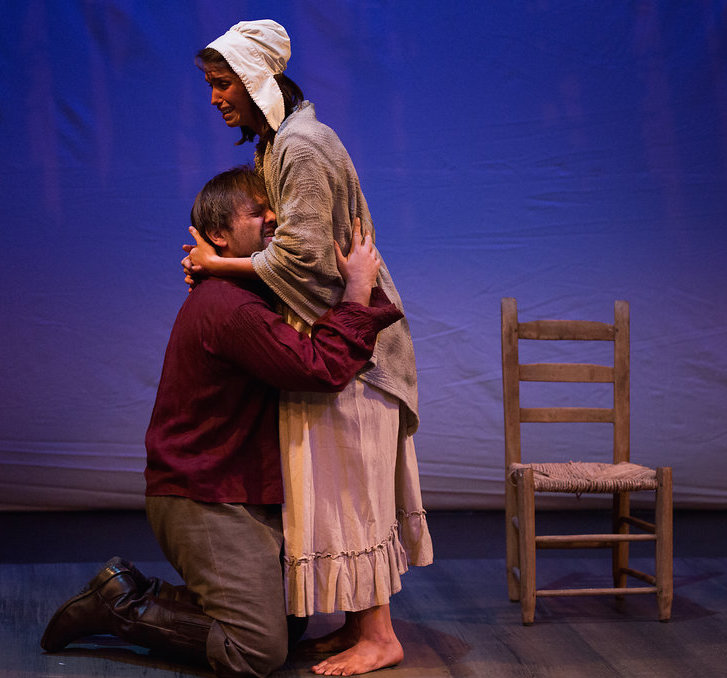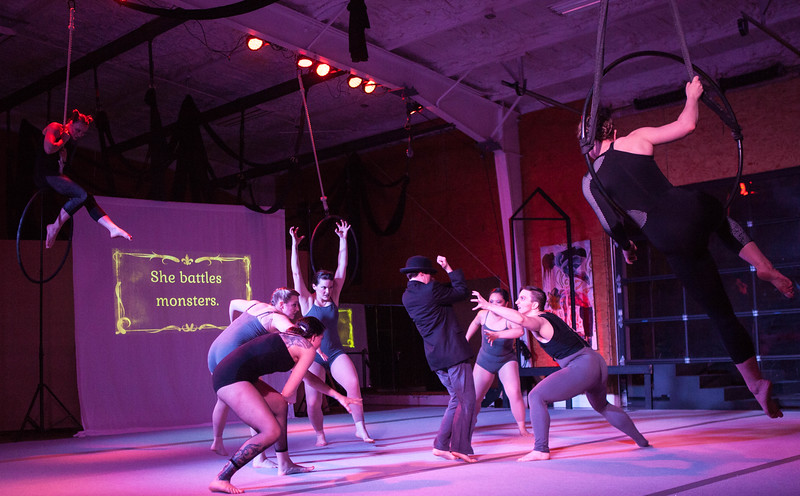Illustration by Cecil Highley.
Theatre of Blood
By Lee Simpson and Phelim McDermott
Directed by Craig Nolan Highley
Review by Keith Waits
Entire contents copyright © 2016 by Keith Waits. All rights reserved
Vincent Price was a wonderful actor in Hollywood from the1940’s on, but he is most famous for a number of gothic horror films made in the 1960’s and 70’s. A series of low budget Edgar Allan Poe adaptations led to some films with higher budgets, such as Theatre of Blood. It may be my favorite of his later movies.
The adaptation by Lee Simpson and Phelim McDermott from the screenplay by Anthony Greville-Bell, changes things, of course; for example: containing all of the action in a derelict theatre that was but one of many locations in the film – logical choice for the stage, and it retains the egocentric characters, as well as the acid satire about theatre critics and their grand guignol murders, based on grisly deaths that are modeled on Shakespeare plays from the final season of an egomaniacal actor long thought dead.
That actor, Edward Lionheart (Sean Childress), is clearly insane, and he carries out his dastardly plan with overblown theatricality, and the play fully recognizes that this is his last and, arguably, greatest performance. In the most important departures from the movie, there is a lengthy exchange between one of the critics, Peter Devlin (Tom Pettey), and Lionheart, about the nature of the relationship between actor and critic. If one knows what was happening in British theatre in the years leading up to 1973, when the play is set, it is clear that the authors have modeled Devlin on Kenneth Tynan, the notorious theatre critic who was invited by no less than Sir Laurence Olivier to become the Literary Manager at the nascent National Theatre of Great Britain; the wolf brought into the fold. Historically, the move was seen as a crucial part of a shift in the interaction between theatre and critics to a cozier, more mutually beneficial circumstance. The heady debate is explored with an intellectual rigor that belies the macabre scenario, and there is a moment when Lionheart seems lucid and insightful enough for us to admire him in spite of his madness. Suddenly, he seems to be making perfect sense. One can only surmise that this debate, which is not in the film at all, lies at the heart of what motivated Simpson and McDermott in their adaptation.
That moment of clarity comes upon us, in part, because Sean Childress’ Lionheart is smart enough not to in any way imitate Vincent Price. There is a close-cropped mustache, but otherwise Childress makes his own choices, creating a vivid physical presence – dominating the stage whenever he is on it, but a somewhat shallow emotional presence that perfectly represents Devlin’s desperate but courageous description of Lionheart as having no underlying foundation in his work, but simply being an actor in love with the sound of his own voice. Mr. Childress declaims the language with force and style, climbing through the vocalizations with abandon and stretching syllables just enough to capture the required grandiloquence with little psychological insight into the madness beyond the crushed actor’s ego, and it feels right. I don’t think the play demands much more than that. It is a star turn now, just as it was for Price in 1973.
Tom Pettey does well by Devlin, bringing commitment to his crucial confrontation with Lionheart, and capturing a good look for the period with his sideburns and flared pants. John E. Trueblood is an excellent Michael Merridew, a flamboyant critic who cannot stand to be separated from his two small dogs, Cecily and Gwendolen (adorable, and underplayed with discipline so that they didn’t steal every scene by Lexi Skaggs and Gracie Miller). They sported the better attempts at English dialects, which were otherwise all over the map. Leila Toba, Andy Szuran, Andrew Mertz, Kathy Todd Chaney, and director Highley fill out the remaining critics/potential victims with confidence, although Mr. Mertz might have overplayed his drunken scene a bit. But the critics are all forced into somewhat ignominious scenarios before they depart the stage, however much fun they might have been to play.
Lionheart has gathered a loyal group of homeless disciples, each one certainly even more disturbed than he, for they carry out his murderous intent with out hesitation, or motive. The group of Tramps work well enough as a mob, and a few distinguish themselves with bits of business here and there. Appearing mysteriously in the theatre is also Lionheart’s daughter, Edwina, who is played by Ashleigh Skaggs with competence but, unfortunately, no feeling for the character, which is actually more complex and contradictory than any other in the story.
The murders are staged by Joey Arena and are surprisingly less bloody than one might expect, but still given some distinction by some reasonable effects. While The Alley Theater does not give any warning of a “splatter zone,” at least one killing did land some blood under the front row seats, so take care when choosing your place in the audience.
My one large criticism is that, although there were several clever choices for pre-show and intermission tunes, there is no music during the play, and this material seems to cry out for it. I longed to hear some rising cathedral organ or menacing string arrangements to help build the tension and underscore Lionheart’s outsize speeches. I cannot help but feel it would help Theatre of Blood more fully realize its intentions.
For this is natural material for The Alley Theater: a good match for the company’s overall aesthetic, but it just misses the giddy, scruffy heights of their best work. This Theatre of Blood is good, but only occasionally prompts a reaction of delight from its audience. Still, for Alley fans, for horror film buffs, for devotees of Vincent Price, this production of an unexpectedly thought-provoking script is a must-see, and worth the trip to Main Street.
Theatre of Blood
September 8 – 24, 2016
Tickets $20
The Alley Theater
615 West Main Street
Louisville, Kentucky 40202
502-713-6178
Alleytheater.org
Keith Waits is a native of Louisville who works at Louisville Visual Art during the days, including being the host of PUBLIC on WXOX-FM 97.1/ ARTxFM.com, but spends most of his evenings indulging his taste for theatre, music and visual arts. His work has appeared in Pure Uncut Candy, TheatreLouisville, and Louisville Mojo. He is now Managing Editor for Arts-Louisville.com.





